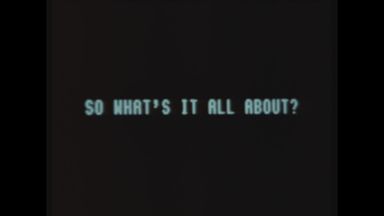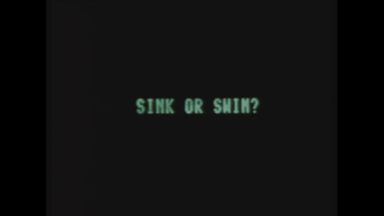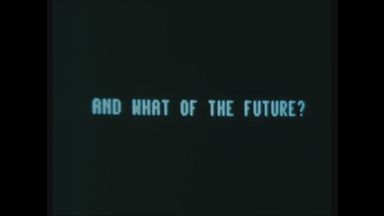The Silicon Factor
2. Sink or Swim?
Clips from this programme
Opening Titles: An industrial robot builds the series title. Graphic design by Charles McGhie; music by Roger Limb at the BBC Radiophonic Workshop
Duration: 00:32A worker in Philips lamp factory in Eindhoven doing soul-destroying repetitive work. This kind of job is being replaced by much faster computer supervised and controlled production lines within the same company. However, despite embracing new technology, Philips is threatened by the Japanese. To survive it needs to use computer technology to improve efficiency but also to include in new products.
Duration: 03:59New products at Philips: Laservision and the first glimpse in the laboratory of the CD player. These were innovative and successful products in the early 1980s and beyond.
Duration: 02:44Gross Cash Registers - a UK company - sank because its mechanical machines were overtaken by Japanese electronic devices using very few parts. Chubb bought up the company and developed new products in an attempt to survive. But they came too late to the party and the production line closed. An object lesson, maybe, for British manufacturing companies.
Duration: 05:11Hornby, a UK company fighting competition, developed new model train systems with more sophisticated controls - one of a very small number of british companies adopting new technology at the end of the 1970s. Edwin Nixon MD of IBM UK emphasises the need for all companies to 'think microelectronics' to survive.
Duration: 01:53Lucas the motor industry components giant tries to stay competitive using new computer aided design and control systems. But is almost alone. Philip Reasbeck Lucas' chief scientist explains that the UK's problem of competitiveness is a lack of understanding, too few properly trained engineers, lack of investment and the brain drain.
Duration: 02:00Small companies in the Thamesmead industrial estate show apprehension, fright and ignorance about the new technology threatening their businesses. A seminar funded by the government microelectronics initiative and facilitated by the BBC fails to convince and shows a lack of knowledge and understanding by small businesses in where to start. Ray Curnow predicts they'll all go bankrupt.
Duration: 07:13Rob Wilmott of Texas Instruments UK compares slow moving British industries with fast moving companies elsewhere. Philip Reasbeck of Lucas points to why we are behind the Americans and the Japanese. In Sweden (a country of only 7 million) there are 30 times more robots than in Britain, doing a wide variety of different jobs Workers in the Swedish Saab factory comment on how their jobs have changed.
Duration: 06:06In 1979 industrial relations in Britain and Scandinavia seem radically different when it comes to the adoption of new technology: confrontation between unions and management and dispute in the UK versus co-operation and partnership in Sweden.
Duration: 06:20Bernard Falk's payoff in a rather spooky, fully automated storage and distribution warehouse in Holland. Attitudes towards this revolutionary new technology in Britain need to change and we need to adapt to the challenges for the workforce.
Duration: 02:29The Silicon Factor
1. So What's It All about?
First broadcast: 19th March 1980
Duration 39:29
The silicon chip, unnoticed by most of us a few years ago, is now something everybody has heard about, few understand and many are beginning to fear. Is it really the basis for a revolution as profound as the industrial revolution? Bernard Falk takes a layman's view of what the silicon chip is, how it's made and works. From a Chicago millionaire's home to a Birmingham car-test track, and from a psychiatric hospital in Scotland to a Swedish factory, he looks at how the new technology is being used and what it could do in the future. Film editor JOHN LYTE Producer DAVID ALLEN.
2. Sink or Swim?
First broadcast: 26th March 1980
Duration 39:10
Is British industry falling behind in its use of silicon chip technology? By using microelectronics in its products or in production, a company can improve its competitiveness enormously. But to ignore the opportunities offered by the chip could lead to disaster when other - largely foreign - competitors are forging ahead. And what of the effects on the workforce if a company 'goes micro ' ? Are our fragile industrial relations capable of adjusting to the changes the new technology will force on us? Bernard Falk reports from Holland, Sweden and Norway to put the British position into perspective. Director ROBERT ALBURY Producer DAVID ALLEN
Now playing
3. And What of the Future?
First broadcast: 2nd April 1980
Duration 39:32
How will the silicon chip affect the quality of our lives and our attitudes to work? Starting in America, Bernard Falk visits places already using the new technology to find out what could be in store for white collar, blue collar and professional workers in the next decade. What kinds of jobs will change or disappear? Are there areas where employment will increase? What will be the effects on the professions? How must our attitudes change if we are to enjoy the benefits of this new revolution and not suffer its worst effects? Production DAVID ALLEN and ROBERT ALBURY













